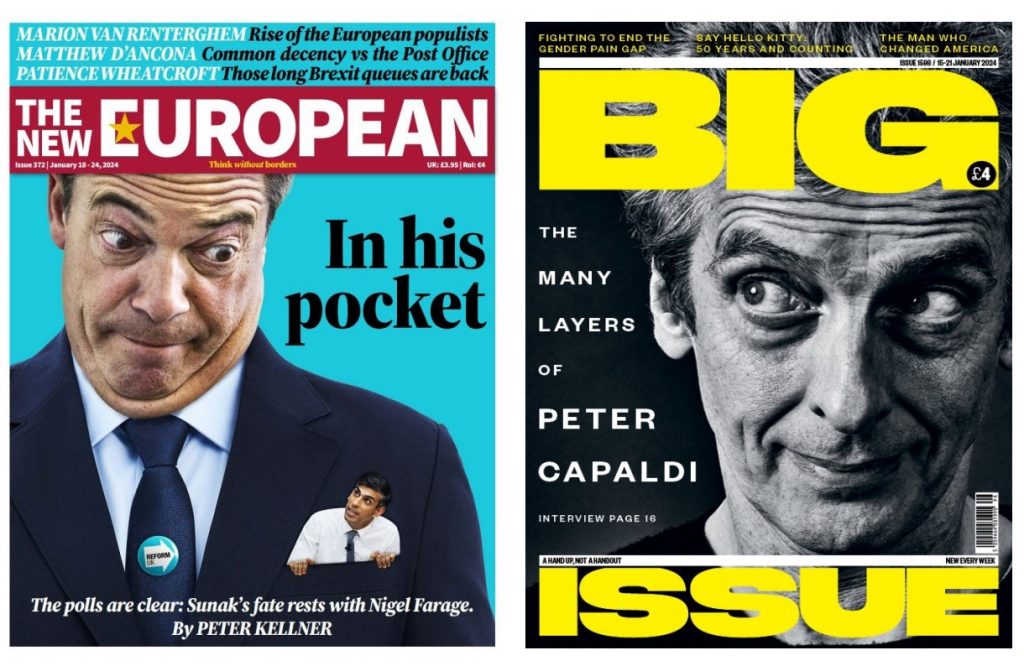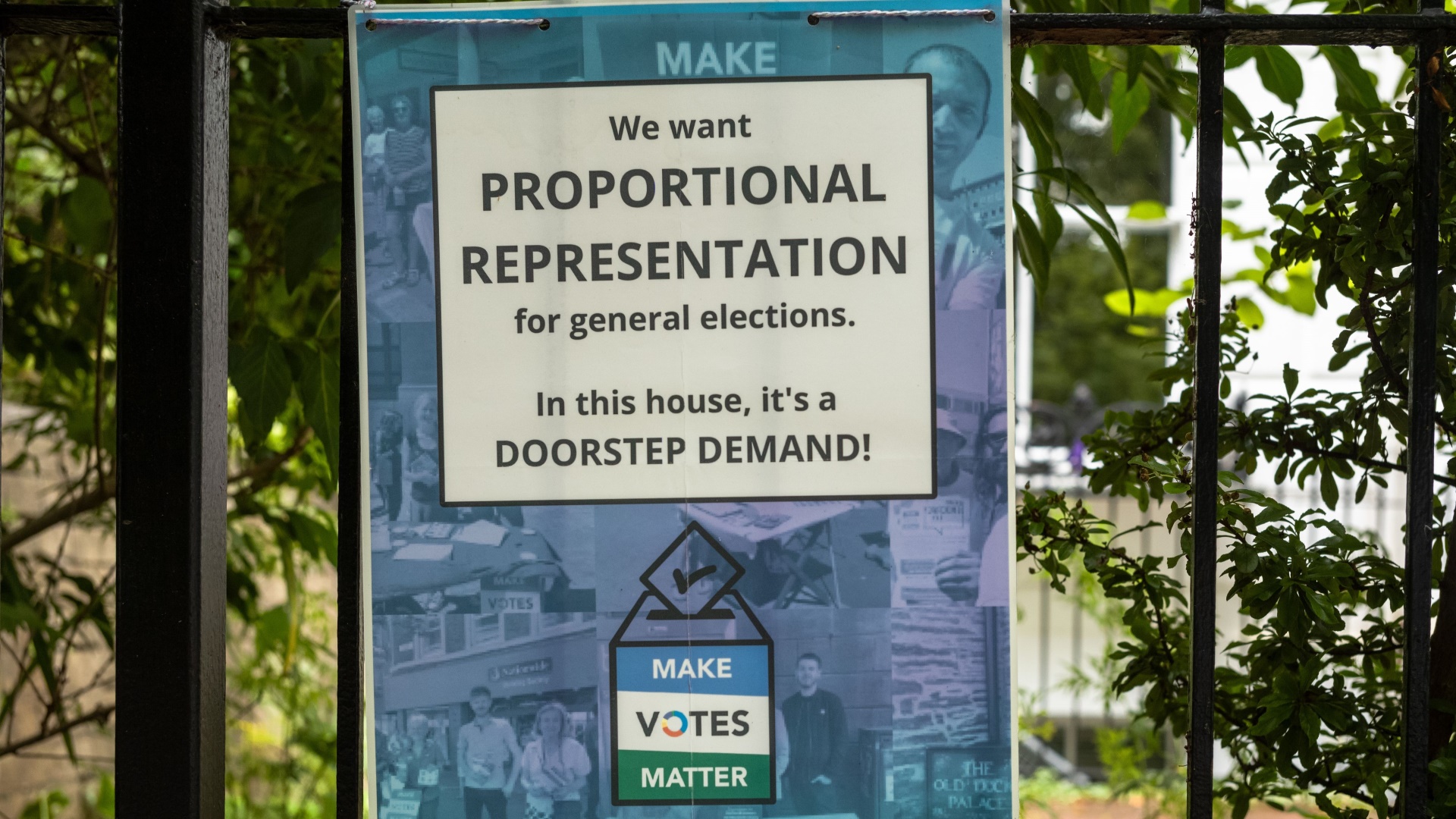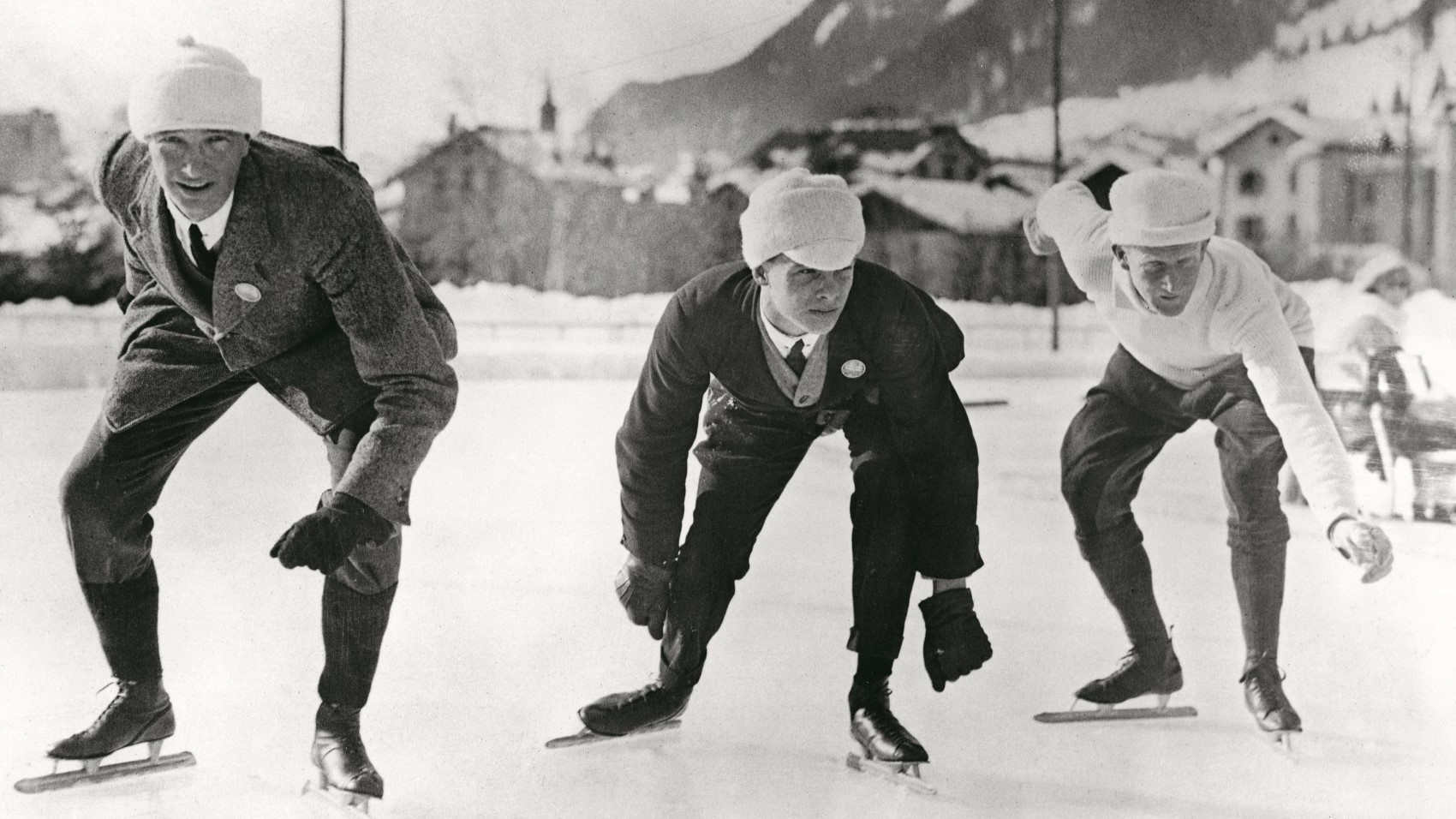Peter Kellner’s interesting analysis of the Reform Party’s impact (“Hostage to Farage”, TNE #372) raises a question I keep coming back to: since First Past the Post penalises minority parties, why don’t Nigel Farage and Richard Tice join the growing calls for proportional representation?
I am looking forward to the Tories’ demise at the next general election, but it is our entire political system that must radically change, not just the government, and for good. PR is the way to make this happen.
Eva Lamb
Keep an eye on Farage’s alliance with Donald Trump. At the Idaho caucus, Farage was visible and name-checked by Trump. Whatever happens with Reform UK, hands across the water will play an increasingly substantial part in the future for Farage.
Trevor Fisher
Stafford, Staffs
Lost marbles
Mandrake (TNE #372) reports that George Osborne is looking for a new director for the British Museum. The Greek ambassador would be a good choice.
Dieter Nowak
Via Facebook
Time to reflect
Patience Wheatcroft (“Love queues? Then it’s good news”, TNE #372) rightly highlights the impending disruption about to be visited upon Kent by forthcoming border controls as a result of the Brexit vote. I wonder, however, just how many of the 970,000 people of Kent who helped to impose this chaos by voting in favour of it will actually be affected by it?
I do hope they live close to the M20 and their journeys across the county are disrupted. While in the traffic they may have time to reflect on their vote.
Steve Brinkley
Felixstowe, Suffolk
Looks familiar

Did anyone notice a symmetry between the covers of TNE #372 and the Big Issue?
Nigel Derby
Chesham, Bucks
Arms race
Re: Paul Mason’s “We’re trying to be a global military power on the cheap… and it shows” (TNE #372). Labour must now kill the myth that they are weak on defence and point to the Tories’ woeful record since 2010:
Some £4bn worth of new BAE Nimrod sub hunters scrapped. Our newly refurbished fleet of Harriers sold to the US for spare parts for £120m. The RAF now down to 107 frontline Typhoons, 244 planes “retired” from the RAF and one aircraft ordered from BAE in 14 years.
The navy is down to 16 frigates and destroyers, with two Type 23 frigates to be scrapped. Our two assault ships now are threatened and we don’t have enough sailors to man the fleet.
The army is down to its lowest level since Napoleon and, as Mason states, the MoD has bungled yet another procurement with the Ajax personnel carrier over budget and years late.
Labour in government needs to re-arm Britain. Of course, the Trots will say we need to spend the money elsewhere. But what is the cost of rebuilding Ukraine?
Alan Quinn
Prestwich, Greater Manchester
I am a subscriber and always enjoy seeing the postman arrive on Wednesdays as I know I will soon be reading the New European. I find Paul Mason, with whose politics I have not always agreed in the past, to be a particularly effective commentator on the post-Brexit problems facing our government, some but not all through their own fault.
Whilst I entirely agreed with Paul’s thesis, I do wish that someone had checked the photo in his article, which is not of HMS St Albans, but of the rather more advanced HMS Dragon (hence the images on either side of her bow) – a Type 45 destroyer launched in 2008!
John Davies
Northamptonshire
Faultless
A special thanks to Mitch Benn for “Vote Conservative. Because NOTHING that goes wrong is EVER our fault” (TNE #372). I have not laughed so much for years. But also a general thanks to all at TNE. You lessen my desperation at no longer being European.
Anne Page
London EC2Y
Post traumatic
Re: Matthew d’Ancona’s “Common decency vs the Post Office” (TNE #372). We have to put public-service values and practices back at the heart of public services. The people running public services must hold those values as central and boards must be made up of people with those values too, and not just business experience.
Peg Alexander
Governments since Thatcher have ruined the public sectors of health, education and services to the point of implosion. The idea of a social contract between citizens and the state has been vilified, leading to inequality, social upheaval and a rise in fraud and scams.
When will politicians understand that this debilitating process is also killing off any meaningful political dialogue?
Nigel Moore
John Simpson (Letters, TNE #372) attributes the lie – “you’re the only one who’s reported this” – to the Post Office call handlers. There was a hint in the ITV drama by an investigator that call handlers may have used scripts provided by management. Any chance that someone employed at the time as a PO call handler could throw any light on this?
Richard McClean
Marple Bridge, Greater Manchester
In “How Fleet Street missed the Post Office scandal” (TNE #371), Liz Gerard rightly gives credit to individual journalists for keeping the shameful miscarriage of justice for some postmasters in the public eye whilst lamenting that most of Fleet Street was blind. The ever-important Private Eye and trade publications, such as Computer Weekly, were on the case from the outset.
I would like to know if mainstream journalists are reading statistical outputs from UK governments and medical journals. Since 2020 the UK, along with many other developed countries, has seen a significant excess in total mortality. During the pandemic, the media treated citizens to a daily toll of deaths. They are now silent about the tens of thousands of excess deaths that continue.
While the postmasters’ treatment by the Post Office, ministers, MPs and citizens is woeful, the non-reporting of significant excess mortality in the UK is on a different scale. Please can a journalist or two stand up and take this brief?
James D Walker
Edinburgh
Growth spurt
James Ball hits the nail on the head in “Labour must keep it green” (TNE #371). The last thing Starmer should be doing is rowing back on the promised massive investment in green technologies and renewables.
The original announcement was the one Labour commitment that cut through to me. It smacked of some long-term thinking and at least the start of a strategy for growth leading to a stronger economy and greater relative prosperity – as long as the benefits are not confined to those running the businesses concerned. It offered a real alternative to the Tories’ inability or unwillingness (or both) to think beyond anything other than what serves their party best in the short term.
However, it is not by itself an overall industrial strategy, nor an overall strategy for growth. It also lacks a detailed plan – for a start, where are all the highly-skilled people going to come from? How are the wider international trade benefits going to be realised when we have turned our backs on the huge single market less than 25 miles from our coast? Where is the inward investment going to come from?
A massive commitment to green technologies makes a lot of sense for economic and climate change reasons. It makes a whole lot more as part of an overall growth strategy that is based on rejoining the single market and customs union, being able to draw on the skills of highly-trained workers from the EU and being engaged with the thinking, research and development that will lead to the next generation of renewable technologies.
Apparently, rejoining the single market – let alone the EU – is not what people are talking about on the doorstep. That’s because no political leaders are willing to talk about it in public or in parliament. If you put it to people that they and the country will be much better off back in the single market and the EU – which around 60% of voters seem to believe anyway – then of course the doorstep chat will change.
Phil Green
Jazz lands
Peter Jones’s fascinating piece “When jazz came to Europe” (TNE #371) omitted to note that here in England there was a huge revival of traditional jazz in the 1950s, which excited and consumed my teenage years. London was the epicentre, though it bloomed in many other towns and cities; in my case Burslem.
The most significant event was the dropping of the ban by the Musicians’ Union on musicians from the USA playing in the UK. From a trickle there was a flood of high-profile, mainly black American musicians thrilling jazz enthusiasts.
The arrival of George Lewis from New Orleans accompanied by our very own Ken Colyer was an exciting time. The Mississippi had come to the UK, and soon after Duke Ellington, Big Bill Broonzy, Count Basie and Stan Kenton. Who would ever forget hearing Kenton’s The Peanut Vendor live?
David Handley
Skipton, North Yorkshire
Clash of ideas
Unlike Will Self (Multicultural Man, TNE #371), I wasn’t alive in the 1970s. But I’d suggest the main redeeming feature was not sherbet lemons but the Clash.
Jonathan Polley
Will Self writes that the only redeeming feature of the 1970s was “cheap and available sherbet lemons”. There was also Marc Bolan, not that he was cheap or available.
Liz Read
What is a win?
Paul Mason (“10 months to save Ukraine”, TNE #371) and all those urging the Ukrainians to continue their war never pose the question, “what does winning for the Ukrainians actually entail?” Driving the Russians back to the previous border? Then forcing the Russians to pay for the reconstruction? The Treaty of Versailles springs to mind, and we all know how that ended. If not the Russians, then who?
Does winning mean maintaining a military presence along the length of any new border? Again, who pays for that? The EU? Nato? The US?
Charles Cronin
Battersea, London
On loan
I thank Peter Trudgill for “Boris should have twigged” (TNE #371), about Gaelic loanwords. But it would have been more informative had Mr Trudgill included possible reasons why three languages indigenous to the UK should have so few loanwords in the standardised version of English.
I suggest that the main reason lies in the various acts of suppression of Gaelic in Scotland and Ireland. Native languages were excluded from use in the law courts. They were also excluded from the school system.
This suppression continued into the 20th century. My mother, a native Gaelic speaker, was corporally punished at school during the first world war and the years after when she and others were caught speaking to each other in their own languages.
Alasdair Macdonald
North Kelvinside, Glasgow



